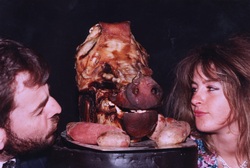Alfred Jarry - From Of the Uselessness to Theatre of the Theatre (1896)

King Ubu (1982)
Let us note that there are many theatre audiences, or at least two: that of the intelligent, small in number, and that of the large number...'
By means of an enclosing mask, the actor should substitute for his head that of the CHARACTER in effigy. This would not have, as in the antique world, the appearance of tears or laughter (which are not characters) but the character of the part: the Miser, the Hesitant One, the Covetous, piling up his crimes...
And if the eternal character of the part is included in the mask, there is a simple means, similar to a kaleidoscope or even more a gyroscope, to highlight, one by one or severally, chance moments...
Through all these incidental happenings the intrinsic expression subsists, and in many scenes the best thing is the impassivity of the mask as it dispenses its hilarious or solemn words. This can be compared only to the inorganic nature of the skeleton concealed under the flesh whose tragic-comic quality has been recognised throughout the ages.
It goes without saying that the actor must have a special voice, which is the voice of the role, as if the mouth cavity of the mask could emit only what the mask would say if its lip muscles were supple. It is best for them not to be supple, and for the delivery throughout the play to be monotone.
(back to Manifesto page)
By means of an enclosing mask, the actor should substitute for his head that of the CHARACTER in effigy. This would not have, as in the antique world, the appearance of tears or laughter (which are not characters) but the character of the part: the Miser, the Hesitant One, the Covetous, piling up his crimes...
And if the eternal character of the part is included in the mask, there is a simple means, similar to a kaleidoscope or even more a gyroscope, to highlight, one by one or severally, chance moments...
Through all these incidental happenings the intrinsic expression subsists, and in many scenes the best thing is the impassivity of the mask as it dispenses its hilarious or solemn words. This can be compared only to the inorganic nature of the skeleton concealed under the flesh whose tragic-comic quality has been recognised throughout the ages.
It goes without saying that the actor must have a special voice, which is the voice of the role, as if the mouth cavity of the mask could emit only what the mask would say if its lip muscles were supple. It is best for them not to be supple, and for the delivery throughout the play to be monotone.
(back to Manifesto page)


